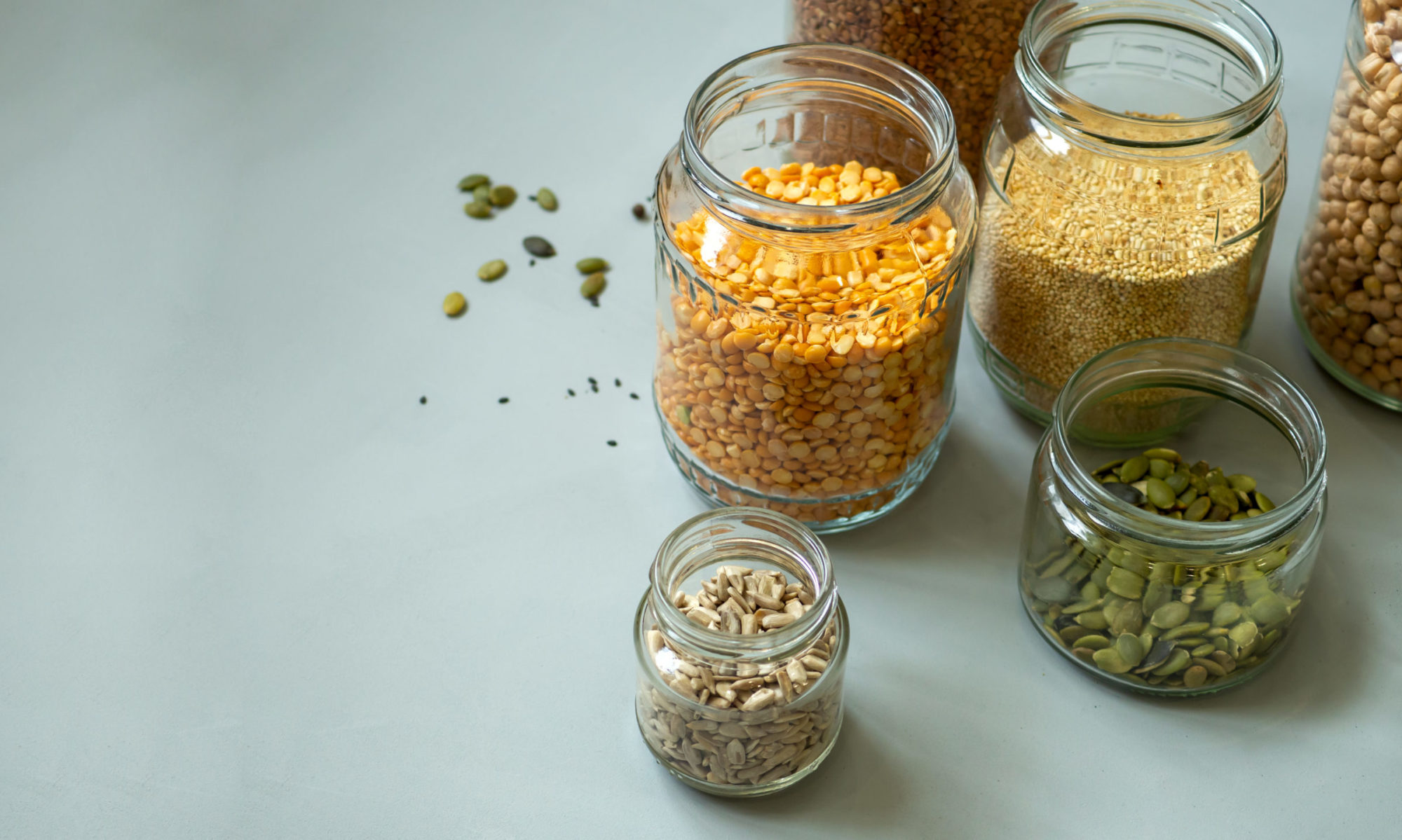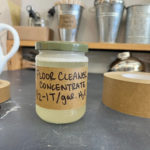Alright, I’m just gonna come right out and say it: New Year’s resolutions aren’t for me.
I’m a list person. Lists all day, every day. Writing down and/or vocalizing our goals are a wonderful way to find focus and commitment in any aspect of life. But I have never been able to properly manage a first of the year, sweeping lifestyle change or “resolution”, with any kind of permanent results.
I have always had a lot more success implementing small changes that over time led to a shift in my consumer mindset. Lasting lifestyle change has been the result and not the goal, if that makes sense.
That being said, here’s a way (well, many small ways) for you to become a more eco-friendly version of yourself in 2022 without making traditional New Year’s resolutions that don’t stick.
The 2022 Eco Mini-Challenges
Alright, so how this works is – instead of one never-ending, perfect or perish resolution – challenge yourself (sounds fun, right?) to focus on various aspects of a sustainable lifestyle each month, and see where you can (and you will!) make improvements.
Even if you don’t stick with each one, you’ll get a taste for different eco-friendly solutions and a feel for what fits with you.
You don’t have to follow the order presented here and if you don’t get to all of them, that’s ok too. Just pick a few that seem like a good place to start and jot one at the top of your calendar each month.
1.
Track Your Trash
A great way to get clear on where you can individually make the most impact and send less to the landfill is to conduct a waste audit.
Know your trash, then reduce it.
What’s a waste audit?
It’s pretty much exactly what it sounds like. You’ll be able to see the big picture of what you’re throwing away for the month (or even just a week!).
Once you’ve tallied up all your trash, look for what items have the most marks. Those are likely the most impactful places where you could start looking for eco-friendly alternatives.
There’s two easy ways to do this:
-
-
- Before you take the trash out to the curb, dump it all out and tally up what’s there. This is a lot more pleasant process if you’re composting your food scraps separately.
- Keep a piece of paper by the trash can and write it down as it goes in.
-
Zero Waste Gainesville has these resources to help, including detailed instructions and a printable table. Or check out this cute video below:
Betsy and her sidekick, Georgia, will show you how to perform a home waste audit to help you begin your zero waste lifestyle. A waste audit helps you learn what you are throwing away so you can begin making different choices to avoid items that create waste.
Bets on the Planet is a show made by kids for kids to help them live a sustainable life that is good for the Earth.
2.
Practice Mindful Shopping
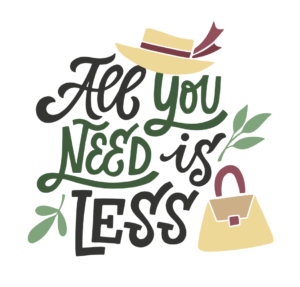
The most sustainable product is the one you don’t buy, but it’s so easy to casually shop when products are being waved in our faces 24/7.
The challenge here is to pause when you pull out your credit card this month. Ask yourself –
Do I really need it?
Will I use it more than once?
Is there a way to get it package free, packaged in, or made from compostable materials?
If the answer is *no* to one or more, just don’t buy it.
Admittedly, this can be tough! Our minds are programmed to get excited about novelty and that boost of serotonin when we buy or gift something is :chef’s kiss:. I will say, there is also a lot of empowerment in successfully saying NO to the barrage of tailored advertisements, so I encourage you to give it a shot.

Ultimately, retraining our thought processes around consumerism shouldn’t feel like restraint or punishment, so feel free to reward yourself in some way whenever you pass on a purchase. It takes a lot of mindful acknowledgment to celebrate not buying something.
Rewards can be anything from relaxing in a bubble bath, to borrowing a new book from the library, or taking a fun fitness class.
Reducing our consumption is one of the most powerful ways we can be environmentally friendly, because so many resources are invested into making new things. Alternatively, you could seek out an eco-friendly alternative, try to borrow it from a friend, make it yourself, or even look for a used one.
Bonus: a very real world benefit from mindful shopping is saving money! All those little (and big) impulse buys in a month can really add up. You’ll see!
my buy nothing month: what i learned when i stopped shopping
find your neighborhood ‘buy nothing’ group or learn how to start one. Declutter your spaces and give where you live
3.
Compost Your Food Waste
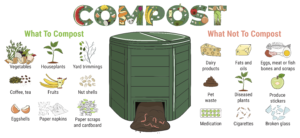
I can’t express enough how important and impactful it is to compost your food waste, no matter your situation. You can contribute directly to a circular economy in a profound way. Not only does food that has been landfilled produce methane, a green house gas contributor, but also it is a missed opportunity to convert those scraps back into rich soil that can be used… to grow more food!
But, before we talk about how to compost, let me back up for a second. Depending on how much food you’re currently chucking every week, you may benefit greatly from taking a few days this month to peruse the websites and social media feeds of people like Anne-Marie Bonneau, Zero Waste Chef.
She will show you how to get the most bang for your buck, with regard to food, food waste, and finding the value in what we may generally consider scraps. It’s inspiring, I love her work!
Now to come back to composting the scraps that are left. From back yard piles to indoor worm bins, there are MANY ways to compost, even if you live in an apartment. Or look for a local composting service. For instance, in Gainesville where I live, there is Beaten Path Compost. They make it so easy with multiple drop off locations around town and they have a weekly pickup for some neighborhoods.
Further, once you get your food scraps out of your trash can, things like waste audits become much easier and you can really get a good look at what is making up the balance of your waste.
There are so many benefits to composting and I feel so passionately about it, that I can safely exclaim if you don’t do anything else this year, you should start composting.
4.
Green Your Cleaning Routine
As spring cleaning routines kick off, be conscious of your scrubbing habits. Mainstream cleaning agents are expensive and often include toxic chemicals that end up in our waterways and pollute humans as well as wildlife. Plus, the packaging is almost always unrecycleable single-use plastic.
See how your current cleaning products are rated on the EWG’s Guide to Healthy Cleaning site
shop our low waste cleaners
There are lots of ways to green your cleaning routine. Swap out rags for paper towels, and try a natural loofah instead of a sponge. You could also make your own cleaners with simple ingredients like baking soda!
Spend the month being conscious of your cleaning habits. Looking for an advanced challenge? See how many days you can go without a paper towel.
5.
Plant a Garden
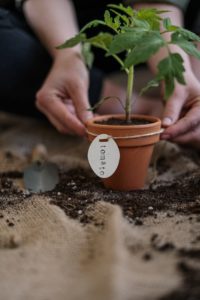
Or just a few containers! Even if all you try this year is a couple herbs in your kitchen window, it counts.
Growing our own food (and buying local) is a wonderful way to embrace sustainability. Plus it’s super rewarding.
The Repurpose Project in Gainesville has tons of pots you can get for next to no dollars.
Looking for easy starter plants? Try corn, cucumbers, squash or zucchini.
6.
Going Meatless
You probably know that our modernized animal agriculture systems are damaging to our environment, but it can be really tough for people to give up meat. Don’t worry, I get it. I encourage you to give it a shot anyway because both the health AND environmental benefits are worth the effort.
7 things that happen when you stop eating meat.
Some tips:
-
-
- Get fresh fruits and seasonal veggies (without all the excess packing!) when you shop at a local farmer’s market.
- Use the googles for recipe inspiration and give some cooking a go. It can be relaxing and somewhat therapeutic.
- Feeling short on time or too tired to think about cooking when you get off work? Look out for future you with some day-off meal prepping.
-
how to store produce without plastic – zero waste chef
Try challenging a friend or family member and see who can sustain a vegetarian or vegan lifestyle the longest. Or take a baby step and see if you can do #MeatlessMonday every week this month.
One of my favorite and EASY meals with minimal dishes is a stuffed baked potato with a mixed green, vinaigrette dressed salad. Ideas for stuffings: roasted veggies (my go-to is broccoli and mushrooms), spinach and cheese, classic butter and sour cream, or peppers and onions with plant-based sausage.

7.
Volunteer for a Green Cause

Your challenge during this month is to sign up for an eco-friendly event like a creek or beach clean up, or planting trees with the Arbor Day Foundation. Bonus points if you bring a friend!
Some Gainesville Orgs that could use your help:
If you’re not able to commit to volunteering in person, consider making a donation if you are able.
8.
Travel Trashless
Another seemingly difficult place to reduce single-use plastics is when we travel. I don’t just mean vacations or work trips. Even our daily commute to work is often fraught with coffee shop stops and midday snacks.
Challenge yourself to see how many days in a row you can go without accepting or using takeaway disposables and single-use plastics.
Also, be sure to say out loud, every time, at restaurants, coffee shops, cafes, and markets: “Thanks but I don’t need a bag, straws, napkins, cutlery, condiments, lids, etc.” Of course don’t list all of that at a grocery store, just what’s applicable. They’ll sometimes forget and still give it to you, keep saying it anyway! Normalize asking for exactly what you need instead of taking disposables you just toss in the trash 5 minutes later.
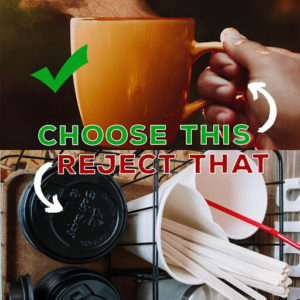
Pro tip: Keep a reusable water bottle, thermos, and set of silverware in the car. Bring your own lunch and homemade snacks. And for mastery level: take a set of clean tupperware with you so you can take home leftovers without a to-go box.
9.
Digital Detox
Don’t think of digital detoxing as eco-friendly? It really is! When you add up all your screen time, you’d be surprised how much energy it consumes.
Check out your digital wellness app for some stats about your smartphone screen time and see if you can cut it back this month.
Set a stopwatch when you watch TV and keep a record of it. See if you can cut back a bit each week.

Bonus: When we reduce our screen time we tend to reconnect with nature. Get outside and touch some grass.
10.
Nurture Your Love of Nature
Sometimes we get so caught up in making our daily lives more eco-friendly, we forget what it’s all about.

Your challenge this month is to schedule four days that you’re going to do something to celebrate the natural world around us. Whether it’s a day trip to the beach, or a picnic in the woods; feeding the ducks, or the seagulls; laying in your front yard and watching the sky or dancing in the rain – take a conscious moment to remember why we’re doing all this. Really feel your connection to mother nature. Again, bring your friends or family and spread the love.
11.
Trim your Transportation
Take a moment this month to look at your transportation. If you drive to work, are there days you could telework instead? What about finding a carpool buddy?
 Do those old bikes in the garage still work? What if you cycle to a nearby restaurant or park for your next date night?
Do those old bikes in the garage still work? What if you cycle to a nearby restaurant or park for your next date night?
When possible, take public transportation instead of driving separately. And if you’re taking a longer trip, drive rather than fly whenever you can!
See what you can do to keep your comings and goings green this year.
12. Share Your Journey
We don’t often think about social media as an eco-friendly act. In fact, in a lot of ways social media contributes to our consumer-driven downfalls.
 But when used for good, social persuasion is a powerful thing. We are most influenced by those we trust and respect, so when we see something posted by a friend, it affects us more.
But when used for good, social persuasion is a powerful thing. We are most influenced by those we trust and respect, so when we see something posted by a friend, it affects us more.
Your challenge this month is to post one day/week about a sustainability win you’ve had this year. Whether it’s a product that’s changed your life and habits, or the basket of veggies you grew in your garden – let’s hear about it!
And don’t forget to tag us at @unplasticgnv. We want to celebrate with you!
Celebrate Your Successes
Adopting sweeping life changes overnight is impractical and unlikely to stick. It’s overwhelming and unnatural.
The best thing we can do for the planet is whatever works within our own lives. If you try these 12 sustainable challenges in 2022 I will be greatly surprised if you don’t find something that brings you joy.
Maybe you discover you love carpooling with your new coworker, or you find community with the wildlife volunteers. Or you discover that it gives you deep satisfaction to tell the waiter “No thanks, I don’t need a to-go box” as you pull out your reusable tupperware.
Whatever works for you, it all contributes to the greater cause. Here’s to a greener 2022!
